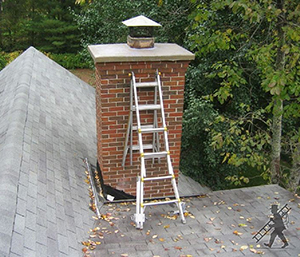Tips on Preventing Water Damage to Your Home
As a homeowner, one of your biggest enemies is water penetration. Keeping water out of your home is crucial because of the amount of damage that it can do. According to the Insurance Information Institute, repairing water damage costs billions of dollars to homeowners every year, which is why professional water leak preventive services can be a smart home maintenance investment. Since 1978, Chim Cheree has specialized in preventing water leaks in masonry chimneys across the Upstate South Carolina region, and we would like to take the time to remind you of some home maintenance tips to help you keep water from damaging your home.
1978, Chim Cheree has specialized in preventing water leaks in masonry chimneys across the Upstate South Carolina region, and we would like to take the time to remind you of some home maintenance tips to help you keep water from damaging your home.
PROTECT THE EXTERIOR OF YOUR HOME
The exterior of your home is constantly exposed to the elements of weather, which, of course, includes water from rain and melted ice and snow. In order to keep that water outside where it belongs, you need to make sure that you have the right types of preventive maintenance in place. When it comes to your chimney, Chim Cheree offers a wide variety of professional services that prevent water penetration, which includes chimney cap installation, flashing construction and repair, and waterproofing. You can count on us to ensure no water is leaking into your home through your chimney. Your roof and your gutter system also play important roles in keeping water out of your home. You should be on the lookout for shingles that are missing, damaged, and aging, and you should also check your downspouts to be sure that they are clear from debris and are positioned to direct water away from your house. You may want to consider installing gutter guards to keep your gutters from becoming clogged so that water cannot accumulate on your roof.
MAINTAIN YOUR PLUMBING SYSTEM
One of the most important components of your home is the main water shut-off valve, and you should know where this valve is located so that you can turn off the water supply to your home if you have a damaged hose or a busted pipe. Turning off the main water supply is crucial in saving time, money, and stress. At least once a year, it is a good idea to check the hoses for your water heater, dishwasher, refrigerator, and washing machine to be sure that they are not cracked or leaking. If you find damaged hoses, you should immediately replace them. Keep in mind that these hoses should be replaced every five to seven years. If you have ever dealt with frozen pipes bursting, you may want to consider having an emergency pressure release valve installed in your plumbing system as this can help to avoid busted pipes during the winter. We also recommend that you inspect the caulking and seals around your bathtubs and showers to be sure that they are watertight.
PREVENT BASEMENT FLOODING
If your home has a basement, you need to be sure that water is being properly drained away from your home. Basement water seepage can be worsened if the soil around the foundation of your home has settled in a way that allows water to flow in a direction toward the building. This can be very problematic, especially after heavy rainstorms when the ground is already saturated because any rainwater will flow down the outside of your home’s foundation. If you have ever noticed water seepage after a storm, you need to have your basement resealed to keep water from entering your home through cracks. By painting the most vulnerable areas with a water sealant, you can restore the deteriorated cement floors and basement walls and prevent basement flooding. Another smart tip to avoid basement seepage is to have a sump pump installed in the basement. We strongly recommend a sump pump to keep your basement dry at all times.
KEEP YOUR POSSESSIONS SAFE
No matter how well maintained your home may be, there could be an emergency situation that results in water entering your home. In order to protect your most valuable possessions, you should never store them where there is any risk of water destruction. This includes any area where plumbing pipes are located as well as any area that is prone to dampness, such as attics and basements. These areas also are at risk for mold and mildew. We recommend that you store your valuables in waterproof bins on shelving that is off the floor so that they are not at risk for water damage. You should also keep a comprehensive and updated home inventory to save time and stress in an emergency situation.
By simply following these tips, you can protect your home from excessive water damage. To make sure that your chimney will keep water out of your home, contact us today at Chim Cheree. Our CSIA-certified professionals can inspect your chimney and recommend the best water penetration preventive services for your home. We are here for all of your professional chimney maintenance, repair, and installation needs.
